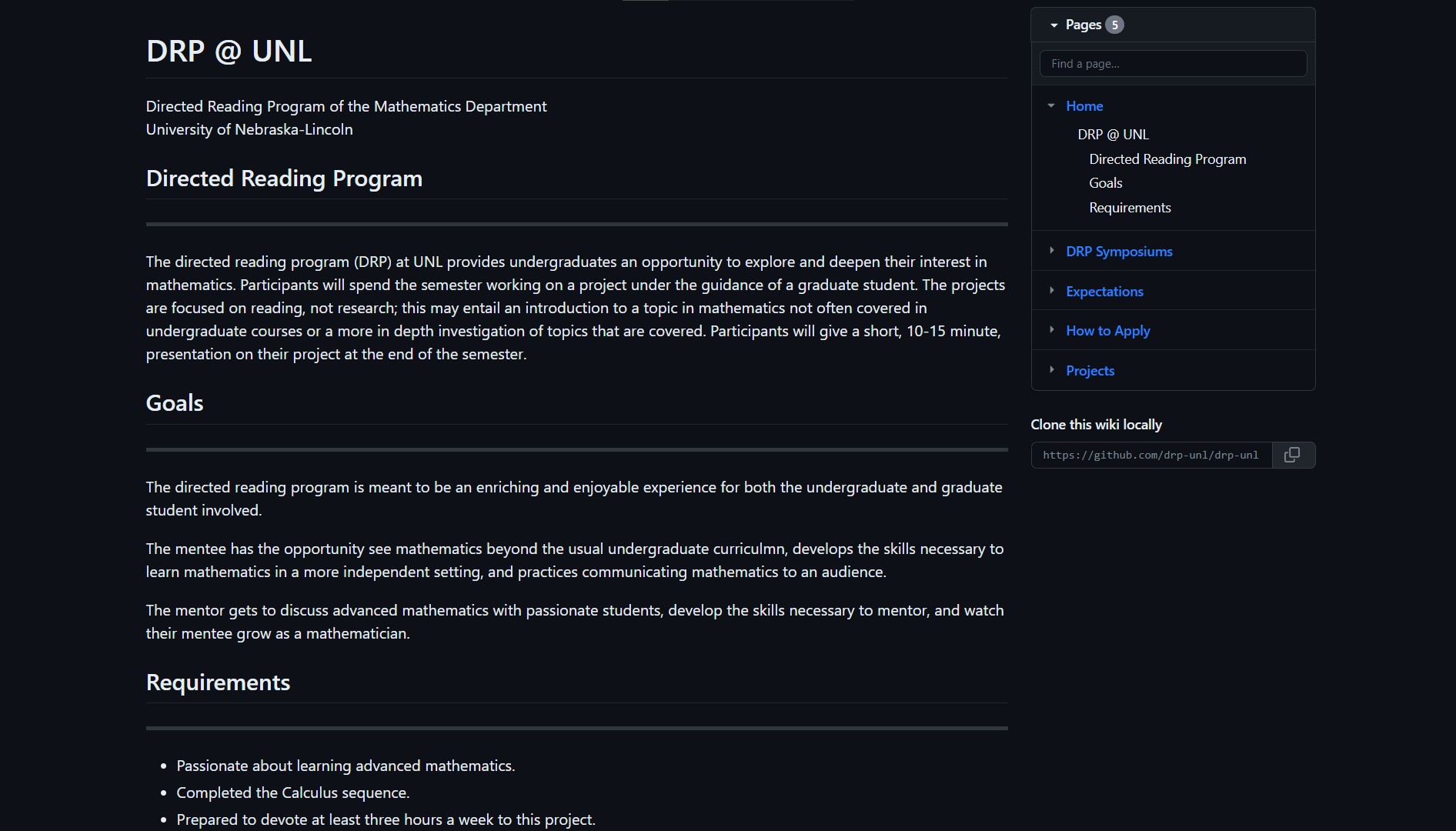
Directed Reading Program Symposium this Thursday
Hello Everyone,
The Directed Reading Program (DRP) at UNL provides undergraduates with an opportunity to explore and deepen their interest in Mathematics by working on a project under the guidance of a graduate student. If you are interested to see what students have learned in their DRP projects this semester and want to cheer them on, the following is a perfect opportunity.
The DRP Fall Symposium is happening this week: Thursday, December 7, 6-8pm in Avery 115 and on Zoom (check your email for the link).
Undergraduate participants will give 10-12 minute talks describing their project this semester. There will be a few minutes for questions after. Pizza will also be provided, thanks to the generous support of Math Club. A tentative list of speaker order with titles and abstracts:
David Dirks (Mentor: Andrew Soto)
Title: Quotient Rings
Abstract: We set out this semester to learn more about Ring Theory in Abstract Algebra, more specifically Ideals and Quotient Rings. First, we established some basic knowledge about homomorphisms and isomorphisms. Along with recalling the ideas of the Kernel of a function and surjective/injective functions from linear algebra, we grew to understand the First Isomorphism Theorem. Then, we began to work with different kinds of Ideals, such as Prime Ideals and Maximal Ideals. After learning these concepts, we applied their ideas to problems dealing with all sorts of rings, particularly different kinds of polynomial and matrix rings.
Kolton O’Neal (Mentor: Ryan Watson)
Title: Split Exact Sequences with an Application to Linear Algebra
Abstract: The splitting lemma is a tool from linear algebra that gives us information about certain short exact sequences. We introduce this tool and use it to give a slick proof of the rank-nullity theorem from linear algebra.
Bishop Placke (Mentor: Wolf Allred)
Title: Introduction to Representations of Finite Groups
Abstract: Representation Theory studies algebraic structures by representing their elements as transformations of vector spaces. The methods of representation theory have found applications in a wide range of mathematical disciplines, from algebraic and differential geometry to topology and quantum mechanics. In particular, we are interested in how representations and their characters can be used when classifying all finite simple groups, which is regarded as one of the crowning achievements of Group Theory.
Noah Sorensen (Mentor: Mikkel Munkholm)
Title: A Brief Introduction to Hilbert Spaces
Abstract: This talk will aim to provide a rudimentary understanding of Hilbert Spaces and their structure. It will begin with a brief explanation of norms, completeness, and inner product spaces. This will lead to defining Hilbert Spaces and a few examples will be given. Next will be the concepts of orthogonality, the orthonormal basis, and unitaries. Lastly, the notion of infinite dimensional spaces will be covered.
Asmaa Elabasy (Mentors: Ben Katz and Derek DeBlieck)
Title: Unveiling Graph Theory and Linear Algebra Harmony
Abstract: This talk begins with an introductory study of fundamental Graph Theory concepts and definitions. As the narrative unfolds, I will showcase how Linear Algebra techniques may be applied to graphs in order to obtain a deeper understanding of graph properties and structures. The presentation covers key concepts including Eigenvalues, Cartesian Product, NEPS (Noncommutative Edge-Product Scheme), and Kronecker Product. The narrative is anchored by the exploration of two important theorems that provide the theoretical underpinnings to easily calculate the eigensystems of certain types of complex graphs. By integrating these concepts, the presentation seeks to underscore the importance of combining Graph Theory and Linear Algebra.
Sophia Duncan (Mentor: Abbey D’Ovidio)
Title: Modeling Cancer with Differential Equations
Abstract: Cancer is a widespread disease in which cells multiply essentially without limit. With that said, cancer growth can be modeled using differential equations. The treatment of this disease can also be incorporated into these equations to understand how it affects both cancerous and healthy cells. Analyzing these systems of equations yields important information about a cell environment, in particular, points at which the system is stable. Specifically, these methods of analysis will be applied to the model for radiotherapy treatment of cancer.
Nick White (Mentor: Dylan McKnight)
Title: Finite Element Method for Time Dependent Partial Differential Equations
Abstract: The Finite Element method is a common methods of numerically solving differential equations. In this talk we will describe some of the theoretical background behind the method, how to implement it for time dependent equations, and see an example of its implementation for the heat equation.
Alexandra Seceleanu
Math Club Faculty Advisor
aseceleanu@unl.edu